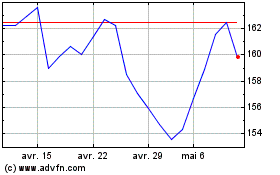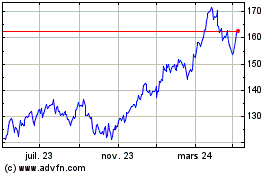By William Mauldin
Republican lawmakers are pressing for a more multilateral
approach to confronting China with expanded help from Europe, a
strategy that dovetails with the view of the incoming Biden
administration.
Republicans from the Senate Foreign Relations Committee released
a report Wednesday on working more closely with European partners,
the United Nations and other market-led democracies.
"It is our populations -- the U.S. and Europe -- that built the
world order of today, not China," said Sen. Jim Risch, the chairman
of the Senate committee, in an interview. "The world order that we
have, based on democracy and based on the rule of law, is where
this planet should go if it's going to have a future."
If Republicans retain control of the Senate, Mr. Risch will
continue leading the chamber's foreign-policy committee, which
President-elect Joe Biden also chaired during his Senate career.
The Idaho Republican said the report wasn't timed with the election
or presidential transition but that he would be willing to work
with a Biden administration on confronting China with more help
from Europe.
Andrew Bates, a spokesman for the Biden transition team, said:
"President-elect Biden agrees that we should stand together with
our allies and partners to press China's government to curtail its
economic, human rights, and other abuses. And he looks forward to
working with both parties in Congress to realize that
approach."
The GOP report, viewed by The Wall Street Journal, recommends
putting aside differences with Europe that have rankled ties both
during the Trump administration and before, including a trade
dispute over government subsidies that has pitted Boeing Co.
against Airbus SE, so that the two sides can work more closely
together on China.
"That really needs to be resolved," Mr. Risch said of the
aircraft dispute, which has continued as China seeks to build its
own world-class passenger planes. "While Europe and the U.S. are
pushing and shoving on the dance floor, the Chinese and the
Russians are watching from the buffet table and being
entertained."
Democratic and Republican views have converged on other issues
related to China, with broad agreement on Beijing's human rights
record, suspicion of Chinese telecommunications firms and
sanctions. Lawmakers from both parties have credited Mr. Trump with
helping raise awareness about the competitive threat of China,
especially in trade.
Yet Mr. Trump has also confronted European countries over trade,
funding for the North Atlantic Treaty Organization and the role of
other international organizations seen by many lawmakers as
important venues for challenging China.
The Trump administration's decision not to enlist broad European
support against China was "a huge missed opportunity of the last
four years," said Anthony Gardner, who was ambassador to the
European Union under President Obama and has been advising Mr.
Biden's team.
Acting unilaterally, Mr. Trump has imposed tariffs on China in
an effort to strike an elusive new two-way economic arrangement,
and his administration has increasingly challenged Beijing over its
maritime claims in the South China Sea and sought to counter
Chinese political and intelligence activities in the U.S.
The White House and State Department didn't respond to a request
for comment on the Senate report. Trump administration officials
have blamed allies for an unwillingness to move quickly enough when
it comes to challenging China's economic or strategic moves, and
some have said it makes sense for the U.S. to set a precedent
before seeking to bring along allies.
Chinese officials didn't respond to a request for comment.
Chinese leader Xi Jinping has sought to contrast Beijing's efforts
to raise its stature in international organizations with
Washington's approach. Mr. Xi, speaking Tuesday at a gathering in
Beijing of leading emerging economies, denounced "unilateralism and
bullying," without mentioning the U.S. or Mr. Trump by name.
The administration has made efforts to enlist partners in
China's neighborhood. On an Asian tour last month, Secretary of
State Mike Pompeo warned several countries that it was in their
best interest to choose the U.S. market-oriented, rules-based
system of commerce and international relations.
Mr. Pompeo last month helped launch a formal dialogue with
Europe on confronting China after receiving an invitation from
Brussels officials, and U.S. diplomats in Europe see the forum as a
promising channel for the Biden administration.
U.S. officials also have worked with dozens of partner countries
to agree to limit reliance on China's Huawei Technologies Co. in
their 5G mobile telecommunications networks.
Some European diplomats have said a coordinated approach may
allow European governments to take a tougher approach collectively
to China than they could take individually, when they would run the
risk of damaging bilateral ties and exposing themselves to pressure
and retaliation from Beijing.
A multilateral approach also might prevent China from singling
out American businesses and farmers for retaliation, as Beijing did
during the trade war. Meanwhile, cooperation with Europe on
technology standards and advanced manufacturing could help Western
companies maintain an edge.
"Alone, the United States and Europe cannot compete with China's
massive market and the large state resources the PRC is pouring
into emerging technology," the Senate report says, referring to the
People's Republic of China.
Daniel Michaels in Brussels contributed to this article.
Write to William Mauldin at william.mauldin@wsj.com
(END) Dow Jones Newswires
November 18, 2020 12:16 ET (17:16 GMT)
Copyright (c) 2020 Dow Jones & Company, Inc.
Airbus (EU:AIR)
Graphique Historique de l'Action
De Mar 2024 à Avr 2024

Airbus (EU:AIR)
Graphique Historique de l'Action
De Avr 2023 à Avr 2024
